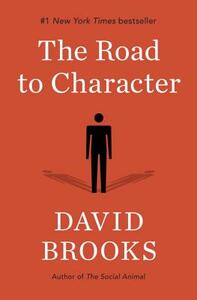Take a photo of a barcode or cover
This book gave me things to think about. The biographies were interesting. I did not always agree with Mr. Brooks' conclusions, but the book did give me food for thought.
I didn’t abandon this book because I disliked the content or the writing; to the contrary, it’s an important topic and I enjoy his approach to it. I just didn’t feel like this was a topic on which Brooks needed to convince me of anything, and I have many more books on my shelf for which that isn’t true. I would recommend this book to the right reader, but that reader isn’t me (at least right now).
I left this book with something like the feeling from reading a good short-story selection, in that while there were a few chapters I thought weaker than the rest, I found the work overall, in its good chapters and its overarching attempt to discover aspects of character often left out of modern discourse. It earned a top rating for the ambition to rekindle old virtues and the humility to get a spark going.
Different readers have different least-favorite chapters, but I thought the work as a whole would have been stronger if it had not left behind the Great Generation with which it started. I liked the George Eliot chapter, but would disagree that devoted romantic love is a particularly neglected virtue, in a class with self-conquest, self-mastery, struggle, and dignity. I loved the Samuel Johnson chapter, but again, thought it should have been replaced with another early 1900s person of character worthy of respect. And the chapter on Augustine, though I've seen it praised elsewhere, really sounded to me like a description from a Bible study class. Unless the Presbyterian church (and Methodist, too) has disappeared when I wasn't looking, I don't think those kinds of messages are being ignored, at least within the church.
After drawing so many persons worthy of emulation from the Great Generation, Brooks made a great point by persuasively arguing that it was the Great Generation itself, in the desire for a simple time to enjoy prosperity after WWII, that began the cultural shift to the Big Me of today. That greatly reduces the potential for the tone to devolve into "kids these days!" grousing, which David also tempers with numerous references to how impressed he is with current youth and their potential.
Finally, I am grateful to Mr. Brooks, because this book made me think of my grandfather and grandmother, whom I loved and respected. It is too late to express to them directly, but the virtues in this book were ones I sometimes saw in them, and now I know what qualities it was that I instinctively recognized and respected in them.
I only hope I can use the insights of this book wisely myself.
Different readers have different least-favorite chapters, but I thought the work as a whole would have been stronger if it had not left behind the Great Generation with which it started. I liked the George Eliot chapter, but would disagree that devoted romantic love is a particularly neglected virtue, in a class with self-conquest, self-mastery, struggle, and dignity. I loved the Samuel Johnson chapter, but again, thought it should have been replaced with another early 1900s person of character worthy of respect. And the chapter on Augustine, though I've seen it praised elsewhere, really sounded to me like a description from a Bible study class. Unless the Presbyterian church (and Methodist, too) has disappeared when I wasn't looking, I don't think those kinds of messages are being ignored, at least within the church.
After drawing so many persons worthy of emulation from the Great Generation, Brooks made a great point by persuasively arguing that it was the Great Generation itself, in the desire for a simple time to enjoy prosperity after WWII, that began the cultural shift to the Big Me of today. That greatly reduces the potential for the tone to devolve into "kids these days!" grousing, which David also tempers with numerous references to how impressed he is with current youth and their potential.
Finally, I am grateful to Mr. Brooks, because this book made me think of my grandfather and grandmother, whom I loved and respected. It is too late to express to them directly, but the virtues in this book were ones I sometimes saw in them, and now I know what qualities it was that I instinctively recognized and respected in them.
I only hope I can use the insights of this book wisely myself.
Ugh. I tried to get through this for a work-related book group. I just can't. This is mean to be short biographical chapers on individials who Brooks admires for their different exemplifications of having "character". The 1st chapter (his own personal intro of what he believes character is) is scribbled with my angry notes on this guys sanctimonious, loaded language that is basically an old man screaming "no one is as good as my generation". But, I read on, hoping the biographies would reedeem this book. Sadly the bios continue to be backloaded with his clearly visible personal slant and I just couldn't continue reading. Adding this one to my "abandoned" shelf.

